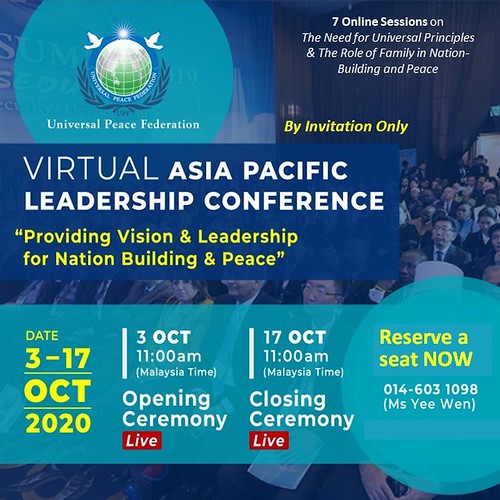Bangkok, Thailand—Travel restrictions due to COVID-19 have forced UPF’s education programs online. From October 3 to 17 and between November 5 and December 14, 2020, two virtual Asia Pacific Leadership Conferences (APLC) were held, on the theme, “Providing Vision and Leadership for Nation-building and Peace.” Combined results from these educational initiatives showed that 97 percent of graduates evaluated the programs as “good” or “excellent” (24 percent and 73 percent respectively). Just three percent of respondents said it was “fair.”
Even more encouraging, no one evaluated the content as either “very poor” or “poor.” (A 5-point Likert scale that measured quality outcome was used.)
Most important, there were two follow-up initiatives built in. First, evaluation questions were drawn from legislation signed into law this year by President Rodrigo Duterte of the Philippines which mandates daily character education classes in grades K to 12.
Having documented results makes it possible for UPF to approach the Philippines government and show them that it has effective education curricula that can help the Department of Education fulfill its legislatively-mandated goals for character education.
The evaluation survey measured seven key areas:
- Building a patriotic spirit in youth
- Developing our inherent human dignity and value
- Accelerating social progress and human development
- Uplifting moral, spiritual and social well-being of students
- Promoting universal values education
- Advocating the role of parents in the moral development of children
- Demonstrating the importance of family and marriage
Educational content for the APLCs consisted of: six sessions on the universal principles of peace, one presentation using sociological studies supporting the importance of marriage and family, and two case studies (Cambodia and Philippines).
The Opening Session and Closing Graduation were live-streamed via the internet; all other educational sessions were pre-recorded. Students had up to three weeks to complete the course.
The second area of follow-up was completed at the local level. Married couples were encouraged to participate in an interfaith peace blessing and young people were invited to connect to Youth and Students for Peace, an affiliated organization and global network of young people dedicated to building a world of lasting peace and mutual prosperity.
In all, 417 participants from 14 nations registered for both conferences. So far, 114 students graduated as others continue to study and are expected to graduate in the future.

